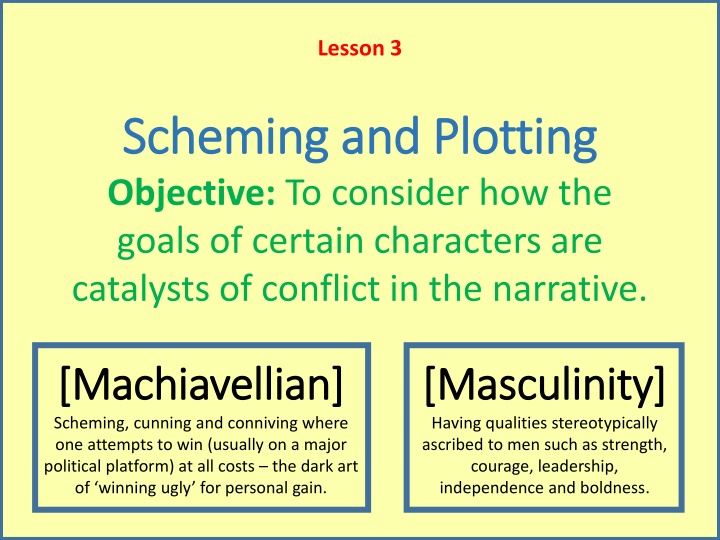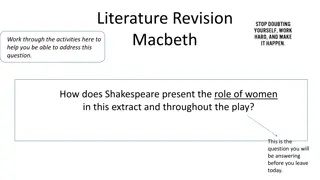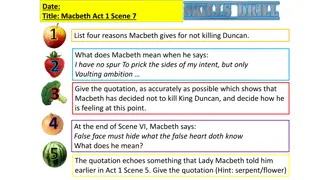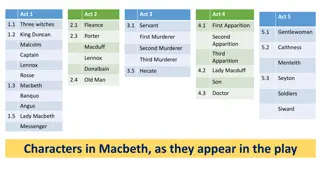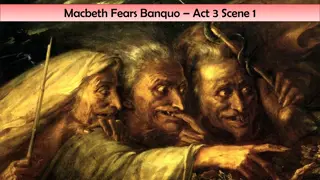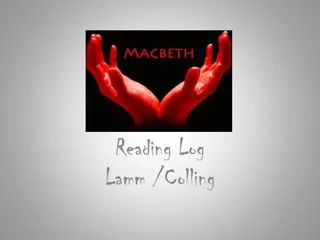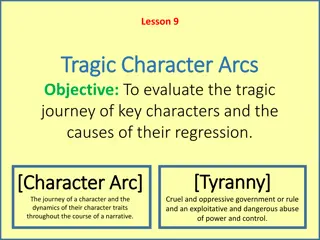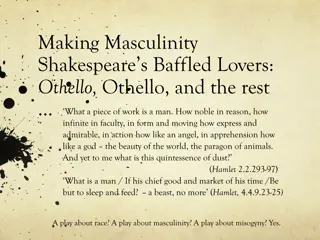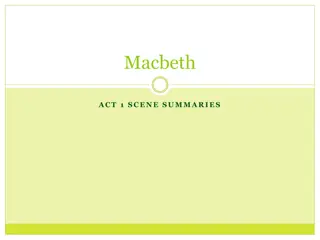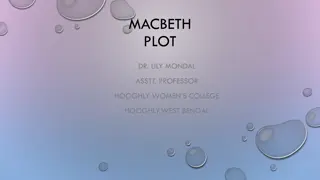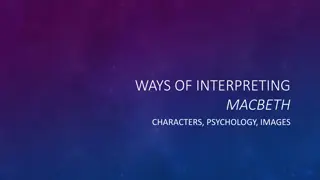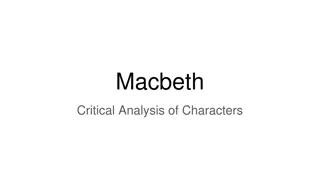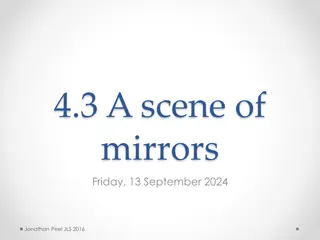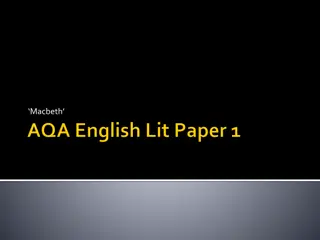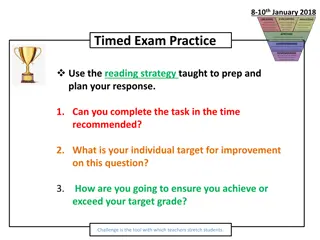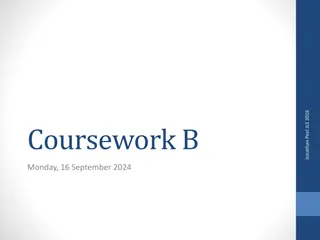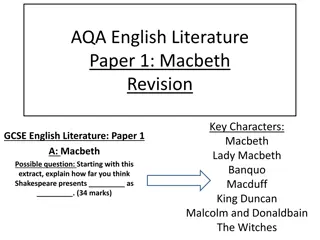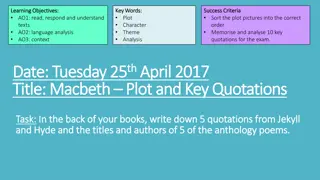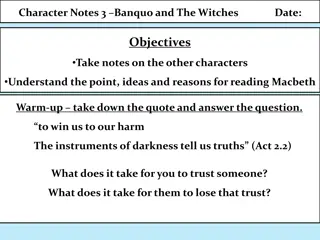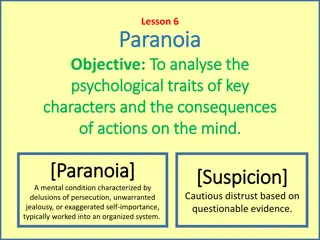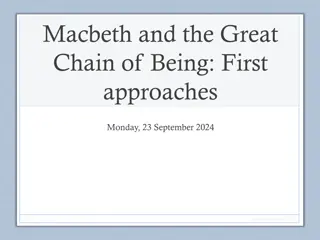Analyzing Masculinity and Machiavellian Tactics in "Macbeth": Character Dynamics and Plot Development
Explore the themes of masculinity and Machiavellianism in Shakespeare's "Macbeth" through character analysis of Lady Macbeth and Macbeth himself. Delve into the scheming and plotting that drive conflicts as characters navigate personal agendas and political ambitions, culminating in Lady Macbeth persuading Macbeth to murder King Duncan. Uncover the depth of character traits, narrative tension, and the interplay of power dynamics in this classic tale.
Download Presentation

Please find below an Image/Link to download the presentation.
The content on the website is provided AS IS for your information and personal use only. It may not be sold, licensed, or shared on other websites without obtaining consent from the author.If you encounter any issues during the download, it is possible that the publisher has removed the file from their server.
You are allowed to download the files provided on this website for personal or commercial use, subject to the condition that they are used lawfully. All files are the property of their respective owners.
The content on the website is provided AS IS for your information and personal use only. It may not be sold, licensed, or shared on other websites without obtaining consent from the author.
E N D
Presentation Transcript
Lesson 3 Scheming and Plotting Scheming and Plotting Objective: To consider how the goals of certain characters are catalysts of conflict in the narrative. [Masculinity] [Masculinity] Having qualities stereotypically ascribed to men such as strength, courage, leadership, independence and boldness. [Machiavellian] [Machiavellian] Scheming, cunning and conniving where one attempts to win (usually on a major political platform) at all costs the dark art of winning ugly for personal gain.
TEACHERS GUIDE 3 Scheming and Plotting To consider how narrative tension develops based on the agendas of certain characters. Objective Think-Pair-Share Character Analysis Starter Act 1 Scene 7 - Lady Macbeth persuades Macbeth to murder King Duncan. Reading Act 1 Scenes 6-7 Scene Analysis PPTs 27:20-29:30 gentle persuasion. 29:30-31:00 manhood challenged caution: scene is suggestive. Film Clip (on estream Macbeth Fassbender version) PEEL Paragraph How has Lady Macbeth been portrayed in Act 1 so far? Main (optional could be set as Homework tasks). Verbal opinion who do you sympathise with most and least in the play so far and why? Plenary Machiavellian, Masculinity. Key terms
THINK PAIR - SHARE Character Analysis Character Analysis Describe three traits of one key character. Describe three traits of one key character.
CLASS READING Act 1 Scene 7 Act 1 Scene 7 Lady Macbeth persuades Macbeth Lady Macbeth persuades Macbeth to to murder King Duncan. murder King Duncan.
PEEL TASK How has Lady Macbeth been How has Lady Macbeth been portrayed in Act 1 so far? portrayed in Act 1 so far?
Act 1 Scene 6 Analysis Act 1 Scene 6 Analysis Calm before the storm Duncan arrives at Macbeth s castle (unaware of plotting and scheming) ironic scene. Duncan - the castle hath a pleasant seat, the nimbly and sweetly recommends itself unto the gentle senses has utmost respect for them both na ve. Final scene honoured host leading the King by the hand essentially to his own grave - dramatic irony Macbeth is preparing for D s murder (not what D thinks: he thinks M has exited for his reception).
Act 1 Scene 7 Analysis Act 1 Scene 7 Analysis Soliloquy inner monologue spoken out loud. Reasoning - Macbeth puts up a very logical argument about why he shouldn t kill King Duncan aware of the slippery slope of murder if it were done when tis done, then twere well it were done quickly. he wants to get this terrible deed over and done with (like ripping off a plaster, no bloodlust) double meaning: could try and kill Duncan as soon as possible (carpe diem). Foreshadowing he is aware that the murder of Duncan will create a chain of events out of his control. Debating - gives a list of reasons why he shouldn t kill Duncan he s king, he s a relative, he s a guest, great king who is loved and respected (his murder would cause a terrible reaction from the people of Scotland). - he even says he has no good reason to kill Duncan no spur (no impetus or cause) except his ambition has almost talked himself out of it and then Lady Macbeth walks in coincidental and significant arrival is she to blame for King Duncan s impending murder through coercing Macbeth into it after he has talked himself out of it. Her persuasive techniques tackles his inconsistent double-mindedness, vindictively uses his love for her as a reason to do it (bribery), calls him a drunkard, challenges his manhood. To challenge his manhood is the main trigger when you durst do it, then you were a man Macbeth s entire reputation is based on his bravery and courage LM is calling his main skill into question and disrepute cowardice is the worst. His counter if we should fail has already given into his wife (has allowed her to take the reins) is under her spell putting himself into her hands fails to stand up to his wife false face must hide what the false heart doth know (theme - appearance vs reality).
Macbeth Lady Macbeth King Duncan Banquo Macduff Macbeth is a Scottish general and the Thane of Glamis who is greeted by prophecies from three witches that he will be made Thane of Cawdor. This comes true. He longs to become King and is then tempted into murder (partly by Lady Macbeth) to fulfill his ambitions to the throne. Once he commits his first crime (killing King Duncan), he is crowned King of Scotland. He is brave but not virtuous. Macbeth is courageous on the battlefield but ill-suited to politics, quickly becoming a tyrant. He becomes suspicious of even his close friends like Banquo. His response to every problem is violence and murder. Macbeth is never comfortable in his role as a criminal and this leads to a psychological regression. Macbeth s wife, a deeply ambitious woman who lusts for power and position. Early in the play she seems to be the stronger and more ruthless of the two, as she urges her husband to kill Duncan and seize the crown. After the bloodshed begins, Lady Macbeth falls victim to guilt and madness to an even greater degree than her husband. Her conscience affects her to such an extent that she eventually commits suicide. Interestingly, she and Macbeth are presented as being deeply in love, and many of Lady Macbeth s speeches imply that her influence over her husband is primarily sexual. Their joint alienation from the world, occasioned by their partnership in crime, seems to strengthen the attachment that they feel to each another. A Scottish nobleman hostile to Macbeth s kingship from the start. He eventually becomes a leader of the crusade to unseat Macbeth. The crusade s mission is to place the rightful king, Malcolm, on the throne, but Macduff also desires vengeance for Macbeth s murder of Macduff s wife and young son. The good King of Scotland whom Macbeth, in his ambition for the crown, murders. Duncan is the model of a virtuous, benevolent, and farsighted ruler. His death symbolizes the destruction of an order in Scotland that can be restored only when Duncan s line, in the person of Malcolm, once more occupies the throne. The brave, noble general whose children, according to the witches prophecy, will inherit the Scottish throne. Like Macbeth, Banquo thinks ambitious thoughts, but he does not translate those thoughts into action. In a sense, Banquo s character stands as a rebuke to Macbeth, since he represents the path Macbeth chose not to take: a path in which ambition need not lead to betrayal and murder. Appropriately, then, it is Banquo s ghost and not Duncan s that haunts Macbeth. In addition to embodying Macbeth s guilt for killing Banquo, the ghost also reminds Macbeth that he did not emulate Banquo s reaction to the witches prophecy. KEY CHARACTERS IN MACBETH Malcolm - The son of Duncan, whose restoration to the throne signals Scotland s return to order following Macbeth s reign of terror. Malcolm becomes a serious challenge to Macbeth with Macduff s aid (and the support of England). Prior to this, he appears weak and uncertain of his own power, as when he and Donalbain flee Scotland after their father s murder. Hecate - The goddess of witchcraft who works to enact her mischief on Macbeth (one of the three witches). Fleance - Banquo s son, who survives Macbeth s attempt to murder him. At the end of the play, Fleance s whereabouts are unknown. Presumably, he may come to rule Scotland, fulfilling the witches prophecy that Banquo s sons will sit on the Scottish throne. Macdonwald Traitor to the King whose army is defeated in battle by Macbeth and executed by King Duncan. Lennox - A Scottish nobleman. Ross - A Scottish nobleman. The Murderers - A group conscripted by Macbeth to murder Banquo, Fleance, Macduff s family (fails). Porter - The drunken doorman of Macbeth s castle. The Three Witches Three black and midnight hags who plot mischief against Macbeth using charms, spells, and prophecies. Their predictions prompt him to murder Duncan, to order the deaths of Banquo and his son, and to blindly believe in his own immortality. The play leaves the witches true identity unclear aside from the fact that they are servants of Hecate, we know little about their place in the cosmos. In some ways they resemble the mythological Fates, who impersonally weave the threads of human destiny. They clearly take a perverse delight in using their knowledge of the future to toy with and destroy human beings.
Key Terms Glossary Key Terms Glossary Language Structure/Narrative Context/concept Analogy - comparison between one thing and another, typically for the purpose of explanation or clarification. Catalyst an element which enters a narrative which causes a reaction usually an increase in conflict and tension. Ambition - desire and determination to achieve success. Emotive language - describes words and phrases meant to evoke an emotional response to a subject. Dramatic irony when the audience is aware of information that the character is not aware of. Hierarchy system where citizens are ranked according to relative status or authority. Iambic Pentameter - a line of verse ten syllables in length each consisting of one short (or unstressed) syllable followed by one long (or stressed) syllable. Enigma mystery and ambiguity developed for dramatic effect withholding of information for the purposes of the narrative. Historical context - refers to the moods, attitudes, and conditions that existed during a certain time. Imperatives command words (usually verbs). Foreshadowing - a warning and indication of a future event. Hubris excessive pride which inevitably leads to one s downfall. Oxymoron - a figure of speech in which apparently contradictory terms appear in conjunction example: fair is foul and foul is fair Irony - the expression of one's meaning by using language that normally signifies the opposite, typically for humorous or emphatic effect. Loyalty - giving or showing firm and constant support or allegiance. Personification human characteristics given to a nun-human form. Motif a repletion of a certain idea or symbol in a narrative Machiavellian - cunning, scheming, and unscrupulous, especially in politics Pun - a joke exploiting the different possible meanings of a word or the fact that there are words which sound alike but have different meanings. Semantic Field - a lexical set of semantically related items, or simply, words and phrases with a similar meaning or context to the subject. Patriarchy - a system of society or government in which men hold the power and women are largely excluded from it. Rhetorical question - a question asked in order to create a dramatic effect or to make a point rather than to get an answer. Suspense - a state or feeling of excited or anxious uncertainty about what may happen Regicide - the deliberate killing of a monarch Soliloquy - an act of speaking one's thoughts aloud when by oneself especially by a character in a play. Tyranny - cruel and oppressive government or rule.
PLENARY PLENARY Who do you sympathise with most and least in the play so far list character names and vote.
